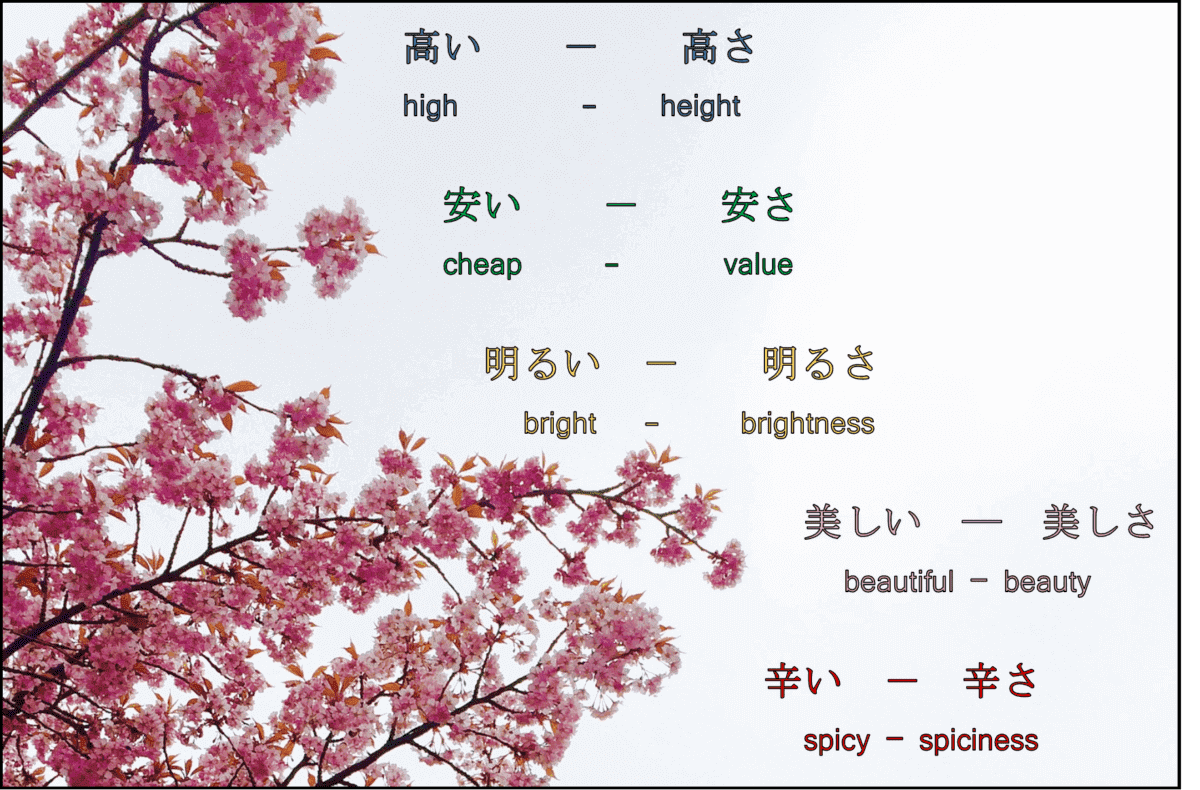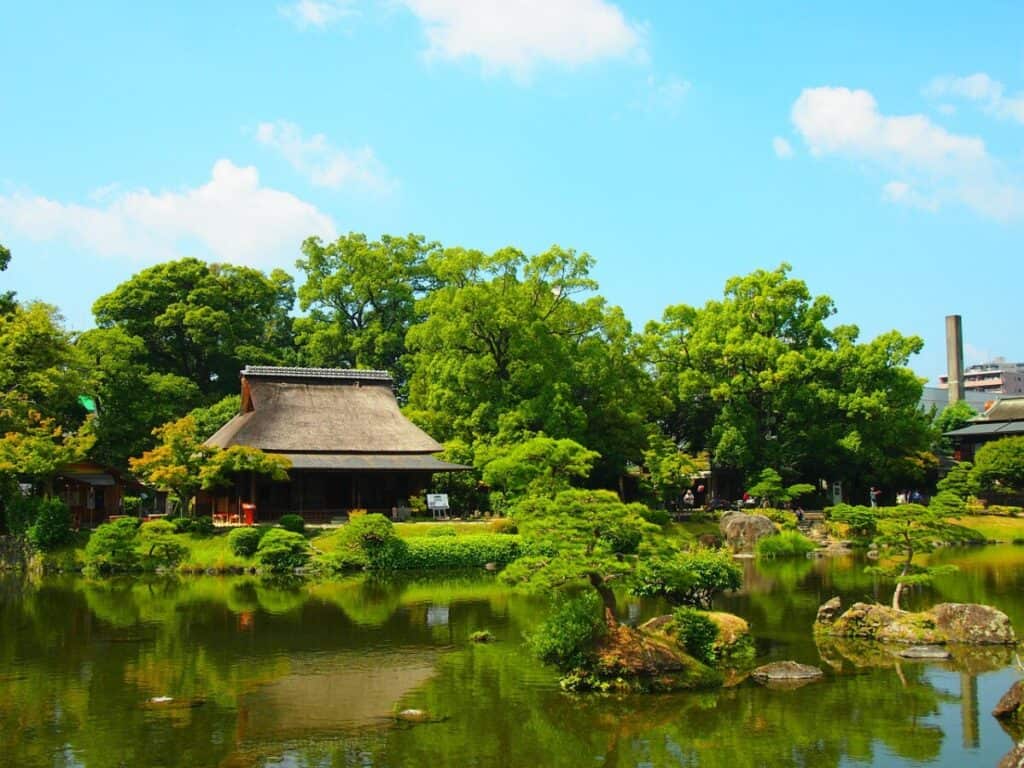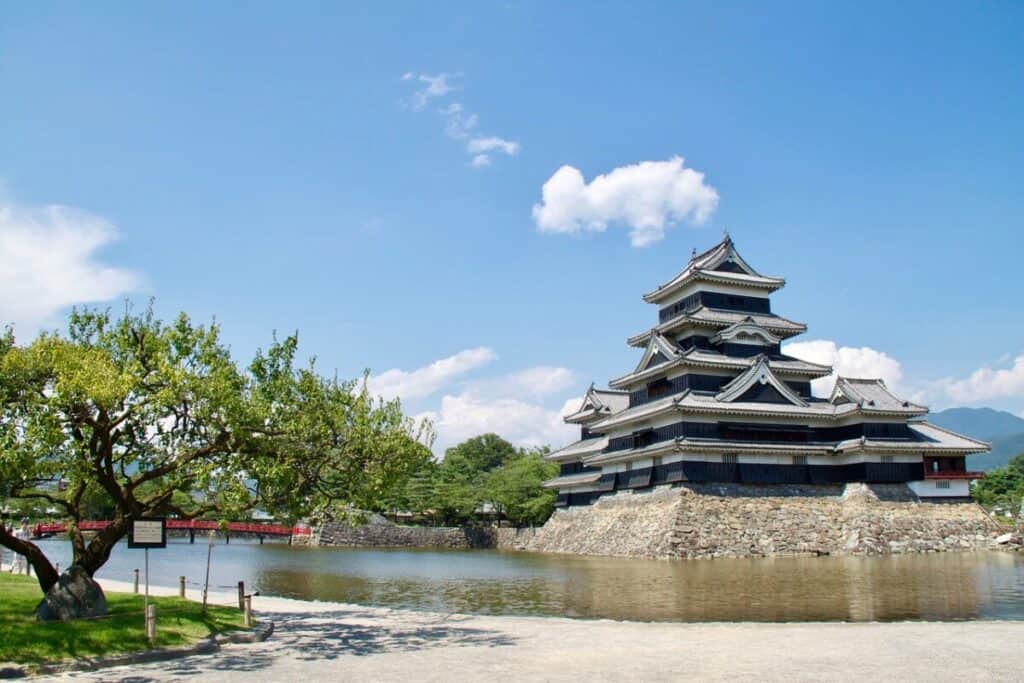Do you want to know how to make nouns from adjectives in Japanese? Then this is a great place to start. In this article, we will be learning how to make nominalized adjectives in Japanese. That is, we will learn how to make an adjective into a noun in Japanese.
How to make nouns from adjectives in Japanese
Firstly, let’s look at an example. Take the adjective 美しい (うつくしい). This is pronounced utsukushii and means “beautiful.” It is an i-adjectives. You can learn all about using Japanese adjectives in this article.
So, a simple sentence would be:
彼女は美しい。 (かのじょはうつくしい)。
This simply means “She is beautiful.”
Now, look at the following examples:
彼女の美しさは珍しい事だ。
“Her beauty is a rare thing”
彼女の美しさに魅了されずにいることは不可能だ。
“It is impossible not to be fascinated by her beauty.”
So, what do you notice? That’s right – for this i adjective, the final “i” has been replaced by さ “sa”.
This is the simple first rule for how to make nouns from adjectives in Japanese. With an “i” adjective, remove the “i” and add “-sa:”
Making nouns from i-adjectives in Japanese
For our lesson, we will use the following 5 Japanese i-adjectives:
1. 高い - 高さ
takai (high) – takasa (height)
e.g. 彼は背が高い ”He is tall.”
2. 安い - 安さ
yasui (cheap) – yasusa (cheapness)
e.g. このケーキは安いです。This cake is cheap.
3. 明るい - 明るさ
akarui (bright) – akarusa (brightness)
e.g. この部屋は明るいです。 This room is bright.
4. 美しい ― 美しさ
utsukushii (beautiful) – utsukushisa (beauty)
e.g. 彼女は美しいです。 She is beautiful.
5. 辛い - 辛さ
karai (spicy) – karasa (spiciness)
e.g. このカレーは辛いです。 This curry is spicy.
Do you know these Japanese i-adjectives? If so, challenge yourself below!
Forming nouns from i adjectives in Japanese – Test yourself:

Can you translate these sentences?
- 富士山は高いです。 → 富士山の高さは3776メートルです。
- この試験は難しいです。 → この試験の難しさが分かりますか?
- このカレーは辛い。 → このカレーの辛さは熱すぎる。
- このスーパーは安い。 → このスーパーの安さの秘密。
How did you do? When you are ready, compare your answers with those below.
- 富士山は高いです。 → 富士山の高さは3776メートルです。
Mt. Fuji is high. → Mt. Fuji’s height is 3776 metres.
- この試験は難しいです。 → この試験の難しさが分かりますか?
This exam is difficult. → Do you understand the difficulty of this exam?
- このカレーは辛い。 → このカレーの辛さは熱すぎる。
This curry is spicy. → This curry’s spiciness is too hot.
- このスーパーは安い。 → このスーパーの安さの秘密。
This supermarket is cheap. → The secret of this supermarket’s value.
Remember, words can carry different nuance in different languages. For example, in question 4, “cheapness” in English would imply a lack of quality, so we use value instead.
Now, let’s look at how to form nouns in Japanese from na-adjectives.
Making nouns from na adjectives in Japanese
This is very similar to forming nouns with i-adjectives. With a “na” adjective, simply remove “na” and add “sa:”
1. 変な - 変さ
henna (strange) – hensa (strangeness)
e.g. 変な人です。 A strange person.
2. 静かな - 静かさ
shizukana (quiet) – shizukasa (quiet)
e.g. 静かな町です。 A quiet town.
3. 下手な - 下手さ
hetana (unskilled) – hetasa (“unskillfulness” – incompetence)
e.g. 下手な選手です。 An unskilled player.
4. 熱心な - 熱心さ
nesshinna (eager) – nesshinsa (eagerness)

e.g. 彼女は熱心な勉強家です。She is an eager, diligent student.
Are you getting a grasp of how to make nouns from adjectives in Japanese? Here are a couple of more complex examples:
田舎のきれいさは町よりいいです。
(いなか の きれいさ は まち より いい です。)
(“The prettiness of the countryside is better than the city”)
静かさが、部屋の空気を占めていた。
(しずくさ が へや の くうき を しめていた。)
(“The quietness filled the room.”)
Using adjectives as nouns in Japanese – Test yourself 2:
Answer the questions below, and when you’re ready compare with the example answers.
1. 富士山の高さは何ですか?
2. あなたの国、夏の暑さは大変ですか?
3. あなたは、日本語の事、熱心さは強いですか?
4. 美しさは何ですか?
Answers:
- 富士山の高さは何ですか?
富士山の高さは3776mです。
2. あなたの国、夏の暑さは大変ですか?
私の国で、夏の暑さはそんなに大変ではないです。
3. あなたは、日本語の事、熱心さは強いですか?
はい、熱心さは強いです!
4. 美しさは何ですか?
そうね、何と言うかな~。

Do you want to learn more about Japanese, Japan, and even living and working in Japan? Then explore out site for more helpful articles and activities!


